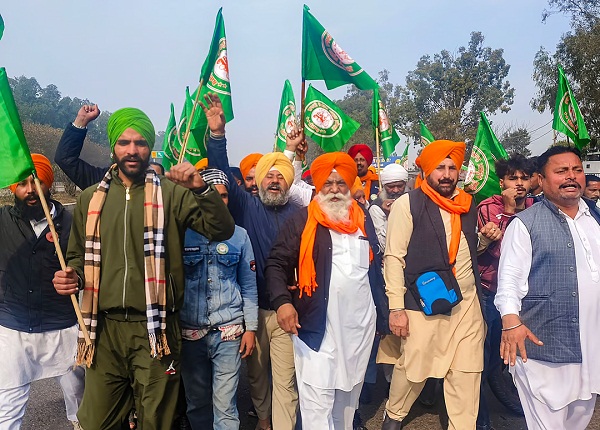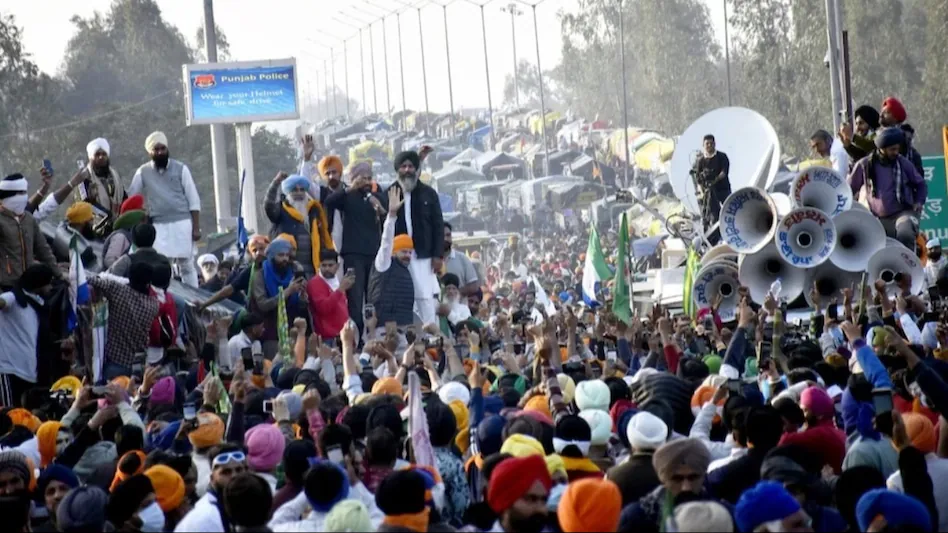During the fourth round of talks on February 18, the Union government presented a significant proposal to farmer leaders, marking the first instance since the commencement of negotiations. The proposal addresses the issue of a minimum support price guarantee.
The group of Union ministers has suggested a plan where government agencies would engage in a legal contract with farmers to procure three pulse crops, maize, and cotton at the Minimum Support Price (MSP) for five years.
“The government-promoted cooperative societies like NCCF (National Cooperative Consumers’ Federation of India) and NAFED (National Agricultural Cooperative Marketing Federation of India) will form a contract for the next 5 years and buy products from the farmers on MSP. There will be no limit on the quantity.” Union Commerce Minister Piyush Goyal made this statement after a midnight meeting with farmers that lasted until 1:30 am.
The farmers were taken by surprise with the new proposal, as it differed from their expectations. They had been advocating for a law ensuring a legal guarantee for Minimum Support Price (MSP) for all 23 crops annually decided by the Union government.
Also Read | CAA will be implemented before Lok Sabha Elections: Amit Shah
In response to the latest proposal, farmers refrained from making commitments to the Union government. They informed the ministers that they would deliberate on the proposal within their forums over the next two days. Subsequently, they would determine the future course of action.
The farmers were represented by Sarvan Singh Pandher, the coordinator of the Kisan Mazdoor Morcha (KMM), and Jagjit Singh Dallewal, the convener of SKM (non-political). SKM is a splinter group of the Samyukta Kisan Morcha (SKM), which played a crucial role in the 2020 farmers’ protests.
Following the meeting, Dallewal informed reporters that they would deliberate on the government’s proposal with their respective forums and experts. He mentioned, “Then, we will come to a conclusion.”

Pandher stated, “If no conclusive result is reached in the next two days, our ‘Delhi Chalo’ movement will continue from February 21. We have additional demands beyond MSP.”
Since the commencement of the ‘Delhi Chalo’ march on February 13, protesters have been stationed at the Punjab-Haryana borders, specifically at Shambhu barrier and Khanauri border points.
As of February 18, Haryana farmer unions, previously reserved, expressed their willingness to join the ongoing agitation if talks between Punjab farmers’ bodies and the Union government proved unsuccessful. Haryana BKU (Chaduni) chief Gurnam Singh Chaduni, a key figure in the 2020 farm protests, conveyed this stance to reporters.
The Punjab unit of the original Samyukta Kisan Morcha (SKM) group announced day and night mass protests in front of the residences of MPs, MLAs, ministers, and BJP district presidents for the next three days, starting at 10 am on February 20 and concluding at 5 pm on February 22.
SKM issued a press statement on Sunday, revealing plans for a national coordination committee meeting in Delhi at 2 pm on February 21, followed by a general body meeting the next day to assess the situation and determine future courses of action. The statement highlighted unmet commitments by the Union government, including the ‘cost and 50%’ model for deciding MSP, guaranteed procurement, comprehensive loan waiver, and opposition to electricity privatization.
BKU Ugrahan, a prominent farmers’ body in Punjab, staged a dharna outside the residences of BJP state president Sunil Jakhar, Captain Amarinder Singh, and Kewal Dhillon. Congress leader Navjot Singh Sidhu also expressed support for the farmers’ demands.
In related developments, the internet shutdown in seven Haryana districts was extended to February 24, while six districts in Punjab are also experiencing an internet shutdown.
